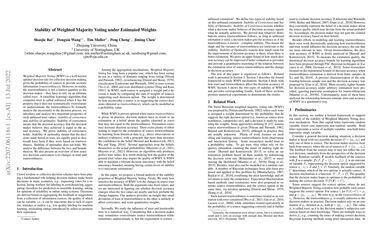Stability of Weighted Majority Voting under Estimated Weights
Weighted Majority Voting (WMV) is a well-known optimal decision rule for collective decision making, given the probability of sources to provide accurate information (trustworthiness). However, in reality, the trustworthiness is not a known quantity to the decision maker - they have to rely on an estimate called trust. A (machine learning) algorithm that computes trust is called unbiased when it has the property that it does not systematically overestimate or underestimate the trustworthiness. To formally analyse the uncertainty to the decision process, we introduce and analyse two important properties of such unbiased trust values: stability of correctness and stability of optimality. Stability of correctness means that the decision accuracy that the decision maker believes they achieved is equal to the actual accuracy. We prove stability of correctness holds. Stability of optimality means that the decisions made based on trust, are equally good as they would have been if they were based on trustworthiness. Stability of optimality does not hold. We analyse the difference between the two, and bounds thereon. We also present an overview of how sensitive decision correctness is to changes in trust and trustworthiness.
PDF Abstract
